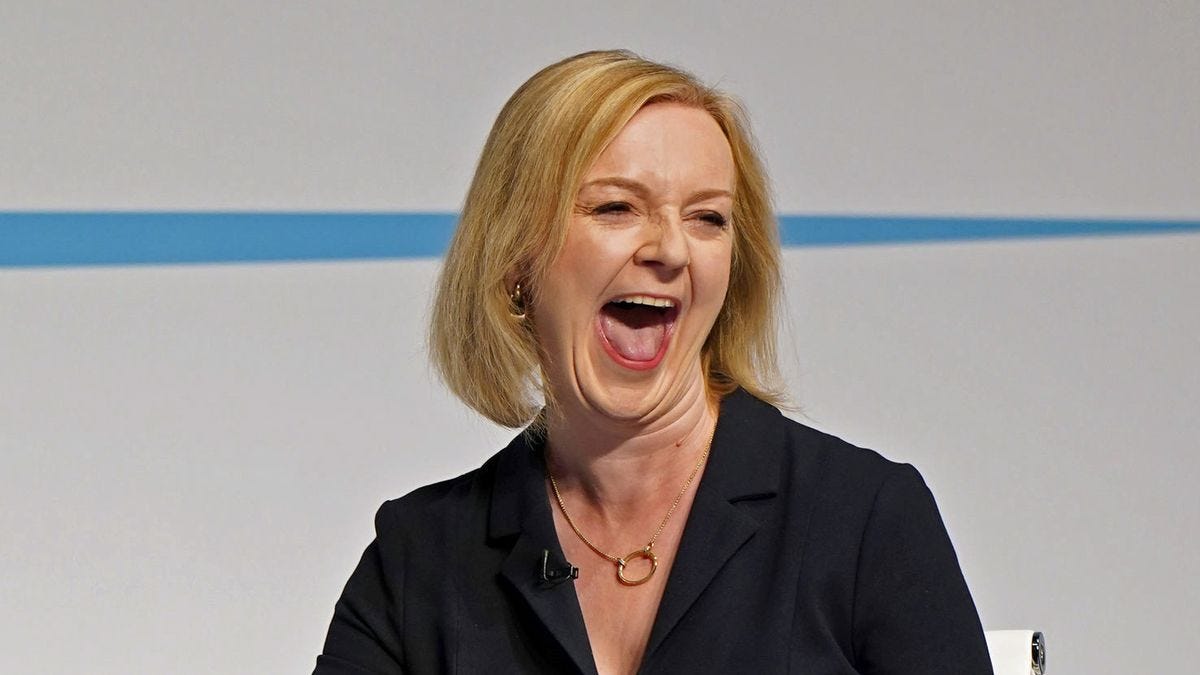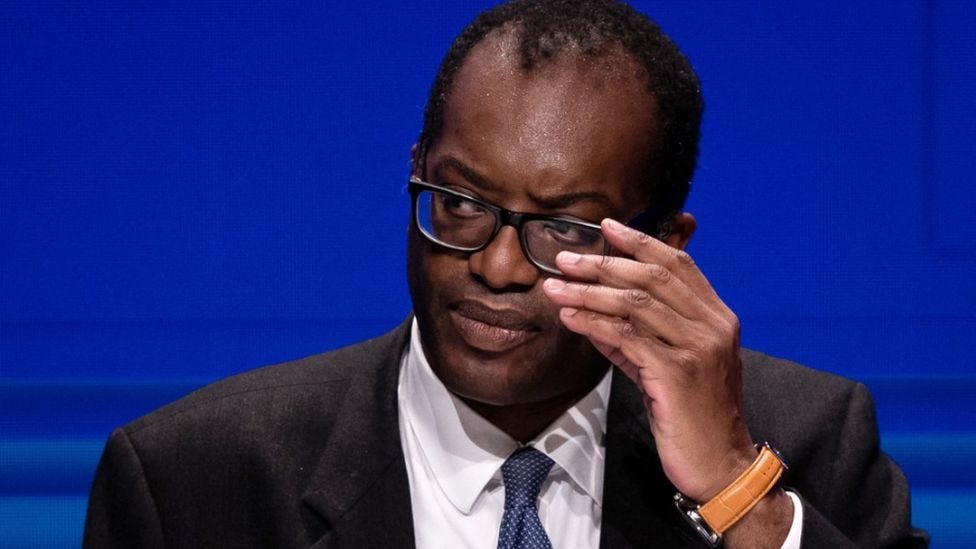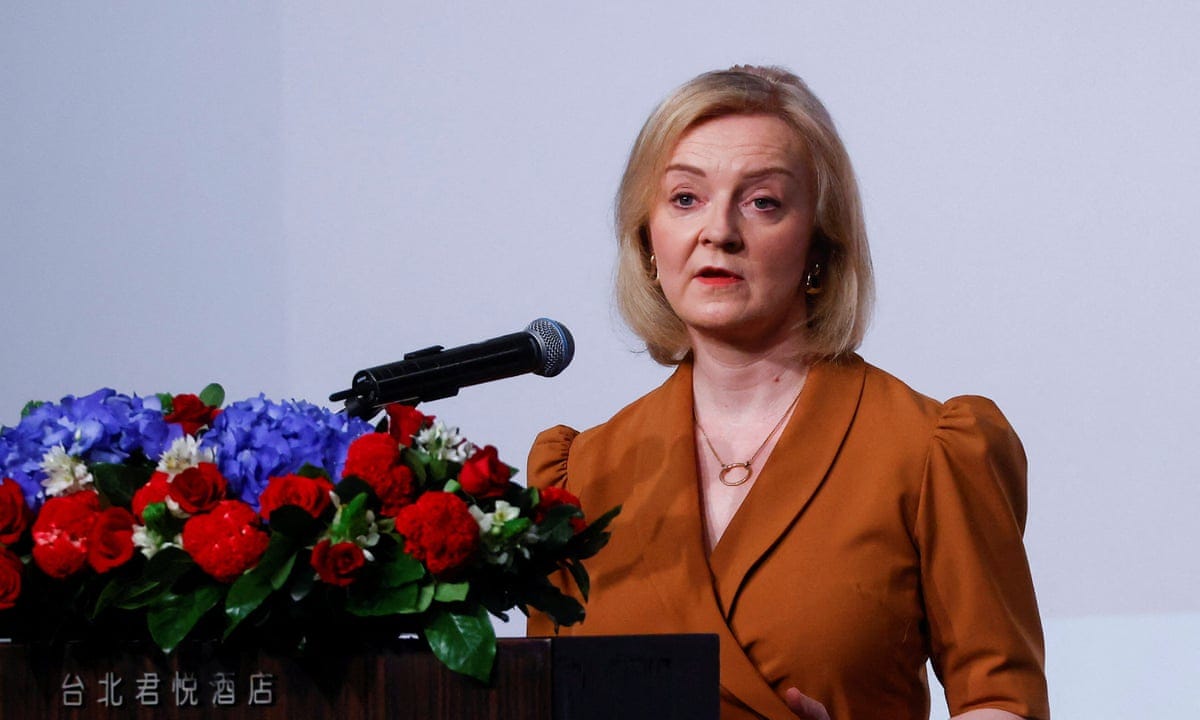Reinventing Liz Truss: is it possible?
Truss will be remembered as the shortest-serving PM in our history, but is she trying gradually to rehabilitate herself and change the narrative of failure
It is hard, at the distance of less than a year, to guess how history will judge Liz Truss and her 49-day premiership. Don’t get me wrong, it won’t be good: but will she fade wholly into obscurity, a lacuna that might not even have happened, like Spencer Compton, the breathing space between Walpole and Pelham? Will she be a penultimate dying gasp, a kind of Lord Rosebery de nos jours, without the aristocratic insouciance and homosexuality? Or perhaps her story will be told as a cautionary late to little Conservatives, a stark warning of what happens when someone’s bandwagon begins to recirculate its own momentum, becomes powered by its own hype and, eventually, runs them over.
You can be certain that she won’t disappear for a while. For the next, let us be statistically generous, 40 years, she will be present at great national events, at the Remembrance Day service at the Cenotaph every November, at state funerals and, perhaps, when some wounds have healed, at Conservative Party conferences. (Don’t laugh: Sir Edward Heath creaked along to conferences under his successors, but only the more publicly to scowl and gurn at the horror which had followed his immaculate reign.)
Truss has pledged, for the moment, to remain in the House of Commons, where she has represented South West Norfolk since 2010. It was not, older readers may recall, an easy selection. She was revealed to have had an affair with Mark Field, MP for Cities of London and Westminster 2001-19, a few years before, when both were married, and some members of the local association regarded this as a black mark, earning the description of “neanderthal” from commentator Iain Dale. Although she had already been nominated, there was a move to deselect her; intervention from the party leader and Central Office saw her confirmed as the candidate 132 to 37.
I confess I’ve always thought it is an odd perch, a rural, mainly agricultural, right-wing fastness which voted two to one for Brexit, given that Truss was a Remainer, despite her late but enthusiastic conversion. She was also in many ways the Cameroon archetype, an Oxford PPE graduate who worked for Shell then Cable and Wireless as an accountant before becoming deputy director of Reform, a trendily centrist and modernising Tory think tank. Her previous attempts to enter the House of Commons had been in Yorkshire, where she had spent some of her youth, in Hemsworth, a safe Labour seat, in 2001 and Calder Valley, a marginal which would go Conservative at the next election, in 2005. But aspirant statespeople must take the opportunities that come along, as Truss, in a very profound way, has done.
It’s easy, but mistaken, to think of Truss’s premiership in comic terms, pull faces and ask “What were they thinking?” Certainly, her tenure was marked by catastrophe after catastrophe, and there is no shortage of people who will say (truthfully or not) that they warned of her unsuitability, warned about her impractical ideas, warned that she was simply not up to the job. I will say, hand on heart, that I did not vote for her. I worked on Penny Mordaunt’s campaign, and when the binary choice of Rishi Sunak and Liz Truss was presented to the membership, I didn’t need to think long before deciding to vote, albeit with barely a scintilla of enthusiasm, for Sunak. But there were people who thought Truss was the answer to the question of the post-Johnson Conservative Party; people who were aware of her track record, knew her well, had seen her at the sharp end of politics, had read her ideological writing and thought she should be prime minister.
This is important, because, as I say again and again, particularly when expounding the virtues of counter-factual history, no-one knew it would end in the disaster it did. Yes, many Conservatives had reservations, but Truss was not elected as a gag or light relief or a stopgap. No-one realised she wasn’t even for Christmas. Legitimate ideological reasons were advanced: Truss, despite her Remain campaigning in 2016, had undergone one of the most thorough transformations into a cheerleader for Brexit; she had acted with conspicuous loyalty to Boris Johnson, while simultaneously keeping her own leadership credentials polished (her social media presence as international trade secretary then foreign secretary was genuinely impressive); and she pledged allegiance to a vehement interpretation of Thatcherite free-market views, providing hope to those troubled by an apparently unconscious drift towards more state intervention and higher government spending.
We know now that, firstly, Truss was overwhelmingly unsuited to the leadership aspect of being prime minister. She has always been an uneven public speaker—YouTube is filled with examples of her oratorical shortcomings with horribly memorable phrases like “That is a disgrace” and “I am a fighter and not a quitter”—and when a new government’s policies are, to be charitable, controversial, it is essential that there is someone plausible and fluent to smooth their path into public acceptance. We also know that the “mini-Budget” (actually a ministerial statement entitled The Growth Plan) which her new chancellor, Kwasi Kwarteng, presented on 23 September 2022 was a disaster, causing sterling to fall sharply, the bond markets to rise steeply, the International Monetary Fund to issue a criticism and the Bank of England to offer to buy £40 billion of bonds to calm the market.
The fall-out from the statement was terminal for Truss. On 14 October, she sacked Kwarteng, making him the second-shortest serving chancellor after Iain Macleod, who died in office in 1970, and brought in the experienced and centrist Jeremy Hunt as a sign of contrition and an appeal for calm. Some elements of the Growth Plan had already been thrown overboard in a desperate attempt to maintain the ministry’s buoyancy: the plan to abolish the 45 per cent rate of tax had become, in Kwarteng’s words, “a massive distraction”; and the publications dates of the Office for Budget Responsibility’s forecast and the government’s medium-term fiscal plan were brought forward in a further effort to reassure the markets and MPs. And Kwarteng’s dismissal itself was another sandbag over the side to keep the Truss balloon afloat; but, as we know, it was not enough.
However, the narrative is now being developed, admittedly among a small group at present, that the problems with the Growth Plan were at worst circumstantial and presentational. Difficulties of this kind were certainly clear and in evidence: the OBR was not asked for an analysis of the plan, which fed subsequent uncertainty; calls for an early OBR forecast were rejected by the Treasury; it transpired that Kwarteng had attended a party on the evening of the statement with a number of financiers and was accused of discussing measures in the Growth Plan in inappropriate detail, although Jake Berry, the party chairman, denied that latter part; and Sir Jon Cunliffe, deputy governor for financial stability at the Bank of England, told the House of Commons Treasury Committee that the government had not consulted the bank before the statement was issued—“Had they asked us what the market reaction would be,” Cunliffe remarked, “we would have interacted with them”.
It is also important to remember that the reaction to the Growth Plan was not universally negative. Alex Brummer of The Daily Mail described it as “seismic” and ‘a genuine Tory package”, and Allister Heath, writing in The Daily Telegraph, called it “the best budget I have ever heard a British chancellor deliver”. Mark Littlewood, director-general of the Institute of Economic Affairs, dubbed it a “boost-up budget” and said it was “refreshing to hear a chancellor talk passionately about the importance of economic growth”. Kitty Ussher, a former Labour Treasury minister but now chief economist at the Institute of Directors, said it was “a good news day for British business”.
It is true that the majority of commentary was critical—Lord O’Donnell, the former cabinet secretary, wins the Sir Humphrey Appleby prize for his terse but lofty “Not ideal”—but there was also a body of thought which noted the boldness of the Growth Plan’s measures and reserved judgement on how it would fare when introduced to reality. The CBI described it as “a new UK growth approach”, a PWC expert admitted it “should help the consumer longer term” and Stephen Phipson, CEO of Make UK, the manufacturers’ organisation, said the statement contained some “positive measures” but cautioned that it was the sixth such plan presented by government in a decade. It is, therefore, valid to look separately at the initial reaction to the Growth Plan, which includes the crisis which engulfed first Kwarteng and then Truss herself, and the philosophy and approach to economics which underlay it.
Liz Truss made much of her “non-traditional” background. By that she meant that her parents, a professor of mathematics and a nurse and teacher, were not conservative by nature; Truss described them as “to the left of Labour” and revealed that her mother had been a member of the Campaign for Nuclear Disarmament in its 1970s and 1980s heyday. They had met at Cambridge in the mid-1960s, her father John at King’s College—despite its age and grandeur, an incubator of student radicalism—and her Priscilla mother at New Hall—recently founded as only the third college for women at the university. Truss recalled her parents taking her on anti-Thatcher marches in the early 1980s (she was born in 1975) and this activism had its effect. At the age of 10, it is related, young Mary Elizabeth had decided that she wanted to be a politician.
The idea of Truss kicking against the left-wing pricks of her upbringing was an irresistible one for her leadership campaign, reinforcing her independence of mind and her self-belief. But her first public political activity was as a Liberal Democrat. At the freshers’ fair in Oxford in 1994, she was supposedly urging students to join her party on the grounds that they would legalise cannabis. I was there, a cowrin’, tim’rous fresher, but I confess I have no memory of it. I would have been unlikely to visit the Liberal Democrat stall. She must have been riding the high of her speech at the previous month’s party conference in Brighton, where she backed the abolition of the monarchy. Yes, it was filmed.
I don’t put this on record to mock or undermine her. Genuinely. She joined the Conservative Party in 1996, when she was 20 or 21, and establishing your political home at that age, the year of your graduation, is nothing to be ashamed of. I am probably unusual in having been, implicitly or explicitly, aligned with the same party since I became politically conscious (though, as I have written, I was scrupulously impartial as a clerk and am pretty sure I did nothing influenced by party sympathy). Many prominent politicians have made substantial political journeys, from the acme of Winston Churchill (Conservative 1900-04, Liberal 1904-24, Conservative 1924-65; “Anyone can rat, but it takes a certain amount of ingenuity to re-rat”, probably apocryphal) to the forgettable Lord Horam, who achieved the unique distinction of sitting as a Labour MP (1970-81), a member of the Social Democratic Party (1981-83) and then Conservative Member for Orpington (1992-2010). But to campaign for the leadership of your party as a dyed-in-the-wool Thatcherite, passionately attached to the free market and wholly committed to Brexit, when your pedigree is very nuanced, does require a degree of humility.
In any event, as the deathless and strangely hard-to-trace phrase has it, we are where we are. Truss is a former leader, the most recent former prime minister at the time being, and still in her prime. She will only turn 48 next month, and let us think about that for a moment. At the same age, Margaret Thatcher was in her first cabinet post, Jeremy Corbyn had just been re-elected as a backbencher in the Labour landslide of 1997, Boris Johnson had won a second term as mayor of London and Keir Starmer was director of public prosecutions. Rishi Sunak will report back from the year 2028.
There is no sign that Truss will go quietly. Last December, she appointed Jonathan Isaby, a stalwart and jocular Tory who was once head of the Taxpayers’ Alliance, as her press secretary, which certainly signals a degree of intent. She recently appeared in front of a live audience in Leigh with GB News’s Dan Wootton (who seems to have blocked me), where she gave a punchy defence of her tenure and stressed her straightforwardness and honesty. She comments favourably on UK trade deals (she was secretary of state for international trade 2019-21) and draws a direct connection between them and the freedom brought by Brexit (“the UK as an independent trading nation”). And, quite rightly and understandably, she attends to and comments on constituency issues in South West Norfolk.
Her most high-profile venture as a former prime minister was her visit to Taiwan last month. Taiwan touches a lot of emotional buttons: a small, ardently capitalist island democracy of 24 million people, ethnically homogeneous and governed by a female, unmarried president. Truss described the island as “on the frontline of the global battle for freedom”, a reference to the designs of China on its smaller neighbour which still maintains the pre-Communist identity of the Republic of China, created when the Qing dynasty was overthrown in 1911 ending 2,000 years of imperial rule.
Tensions between China and Taiwan have been rising for some time now, and there are fears that these will reach a crisis point within a few years, as I have written here and here. I am not the only one who sniffs trouble in the air: my friend Professor Niall Ferguson of the Hoover Institution at Stanford has written and spoken extensively on the subject. Truss gave a serious speech to her hosts, in which she proposed the formation of a “network of liberty” or an “economic NATO” as a counter-weight to Beijing. She also made quite clear that diplomacy had to carry the backing of military might. “We cannot pretend we have meaningful deterrence without hard power,” she told her audience. “If we’re serious about preventing conflict in the South China Sea we need to get real about defence cooperation.”
I mention the visit to Taiwan because it draws together the threads of what I suspect Truss wants her future to look like: brave, outspoken, unwaveringly in favour of free markets and free trade, and a hawk who reluctantly but dutifully realises that not all arguments are subject to negotiation. The shades of Thatcher are unmissable; indeed, Thatcher was the last major Western political figure to visit Taiwan, in 1996, when she talked about, you’ve guessed it, free trade and independence. This also brings us back to that Growth Plan and Kwasi Kwarteng’s calamitous ministerial statement last September.
It is a task which would have had Heracles admitting defeat and opting for a quiet retirement in Thebes, but if Team Truss can breathe life into a narrative which says that her underlying Thatcherite instincts were sound and fell victim to poor presentation and, perhaps, a degree of undermining by the now-famous anti-growth coalition which was determined that she should fail, then it is just possible that she can create some kind of coherent legacy. Certainly her public performances since her resignation as prime minister have supported that general thrust.
I’m not saying that Liz Truss is going to make a conventional comeback and may lead her party again, or even, Alec Home-like, serve in its innermost counsels. But Truss, for all her many failings, is not stupid. She is clearly ambitious—that was clear during her rise through the ranks of cabinet from 2014—and she must have at least enough self-awareness to realise that, unless she takes control of her image and reputation, she is destined at be at best a particularly tricky quiz question (“Which prime minister read a lesson at the state funeral of Elizabeth II?”) or a half-remembered epitome of political failure. The last year has taught me to expect anything in politics, and I confess that Liz Truss’s partial rehabilitation would not be the oddest thing I have ever witnessed. If it happens, you heard it here first.






Thank you as ever for keeping us abreast, dear Eliot. But is there perhaps a rather important "un" missing from the phrase beginning, "Truss was overwhelmingly suited"?